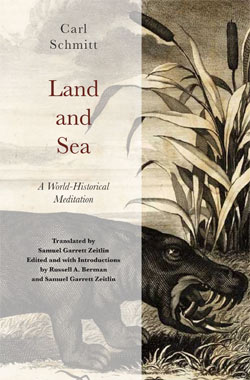In today’s episode of the Telos Press Podcast, David Pan talks with John Milbank about his article “A Tale of Two Monsters and Four Elements: Variations of Carl Schmitt and the Current Global Crisis,” from Telos 201 (Winter 2022). An excerpt of the article appears here. In their conversation they discuss the three idioms into which Milbank divides Carl Schmitt’s thought; why they should be seen as separate idioms rather than different aspects of a single perspective; the extent of overlap between the idioms; whether the decisionist Schmitt is as arbitrary as he is made out to be; the characteristics of a medieval European conception of nomos that Schmitt wishes to retrieve; the similarities between Schmitt’s third idiom of global regions and both Nazism and Russian theorists like Gumilev, Panarin, and Dugin; Schmitt’s decisionism, basic values, identity, and thinking through popular sovereignty. If your university has an online subscription to Telos, you can read the full article at the Telos Online website. For non-subscribers, learn how your university can begin a subscription to Telos at our library recommendation page. Print copies of Telos 201 are available for purchase in our online store.
|
Writing at the Cambridge Review of International Affairs, David Ragazzoni reviews Carl Schmitt’s Land and Sea: A World-Historical Meditation, published by Telos Press Publishing. Translated by Samuel Garrett Zeitlin and co-edited by Russell A. Berman and Samuel Garrett Zeitlin, Schmitt’s Land and Sea is now available for purchase in our online store. Save 20% on your purchase by using the coupon code BOOKS20.
In a new review essay in Thesis Eleven, Peter Murphy writes about Carl Schmitt’s Land and Sea: A World-Historical Meditation, translated into English by Samuel Garrett Zeitlin and published by Telos Press Publishing. Purchase your copy of Schmitt’s Land and Sea in our online store and save 20% by using the coupon code BOOKS20. An excerpt from the review:
Writing at the Claremont Review of Books, Aaron Zack reviews the new English translation of Carl Schmitt’s Land and Sea, now available from Telos Press. Purchase your copy in our online store and save 20% by using the coupon code BOOKS20.
“The human receives a particular historical consciousness from his ‘space,’ which is subjected to great historical transformations. The variegated forms of life correspond to equally differentiated spaces. Even within the same time period, the environment of individual humans for the practice of daily life is already defined differently by their different life occupations. An urbanite thinks the world otherwise than does a peasant farmer, a whale-fish hunter has another living space than an opera singer, and to a pilot the world and life appear otherwise not only in other lights but also in other quantities, depths, and horizons.” —Carl Schmitt, Land and Sea: A World-Historical Meditation “The human is a land-being, a land-dweller. He stands and walks and moves upon the firmly grounded earth. This is his standpoint and his soil; through it he receives his viewpoint; this defines his impressions and his way of seeing the world. He receives not only his field of vision but also the form of his gait and his movements, his shape as a living being born and moving upon the earth.” |
||||
|
Telos Press Publishing · PO Box 811 · Candor, NY 13743 · Phone: 212-228-6479 Privacy Policy · Data Protection Copyright © 2024 Telos Press Publishing · All Rights Reserved |
||||








